人教新目标版七年级下册 Unit 10 I'd like some noodles Section A Period One 课件(共83张PPT)
文档属性
| 名称 | 人教新目标版七年级下册 Unit 10 I'd like some noodles Section A Period One 课件(共83张PPT) |  | |
| 格式 | ppt | ||
| 文件大小 | 6.0MB | ||
| 资源类型 | 教案 | ||
| 版本资源 | 人教新目标(Go for it)版 | ||
| 科目 | 英语 | ||
| 更新时间 | 2023-06-27 06:23:18 | ||
图片预览




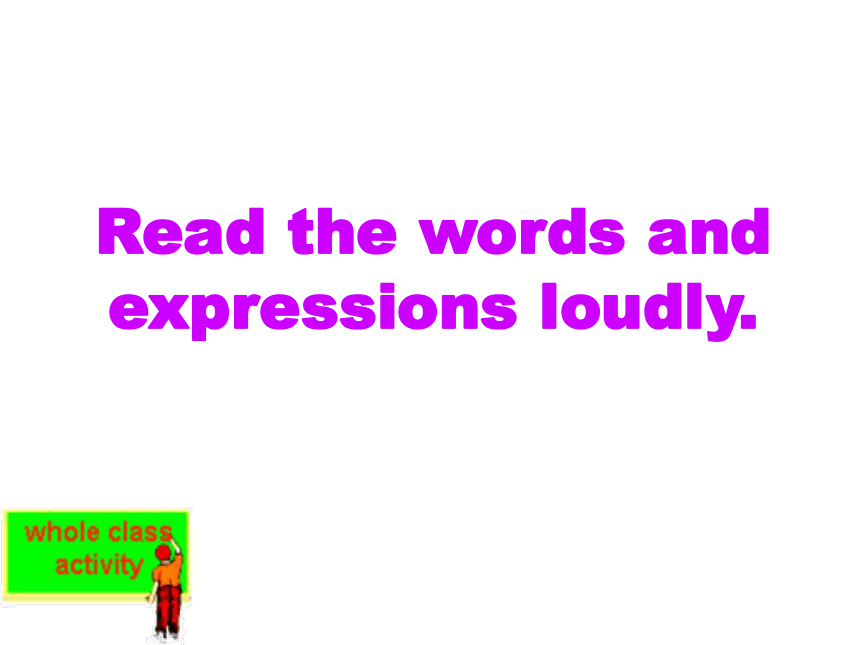
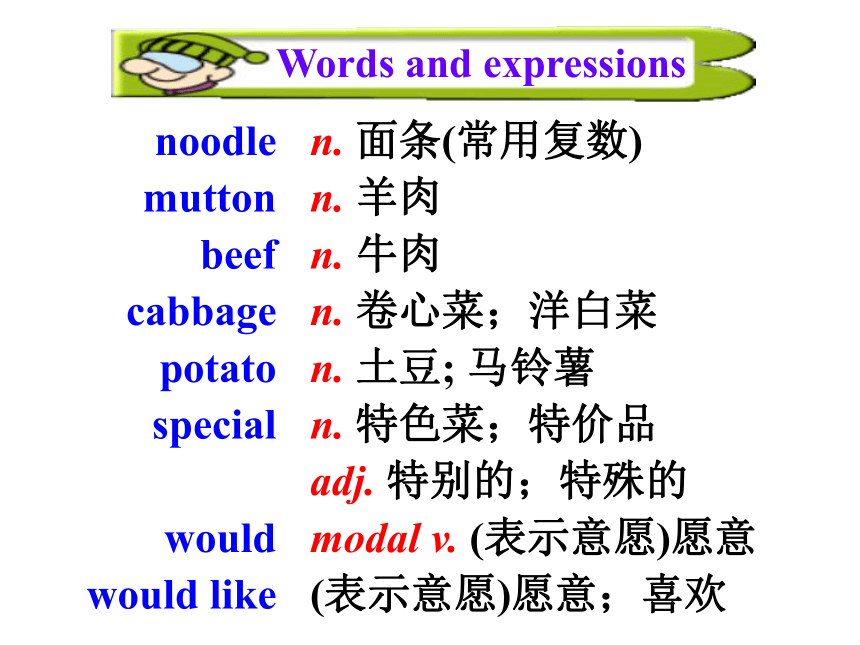
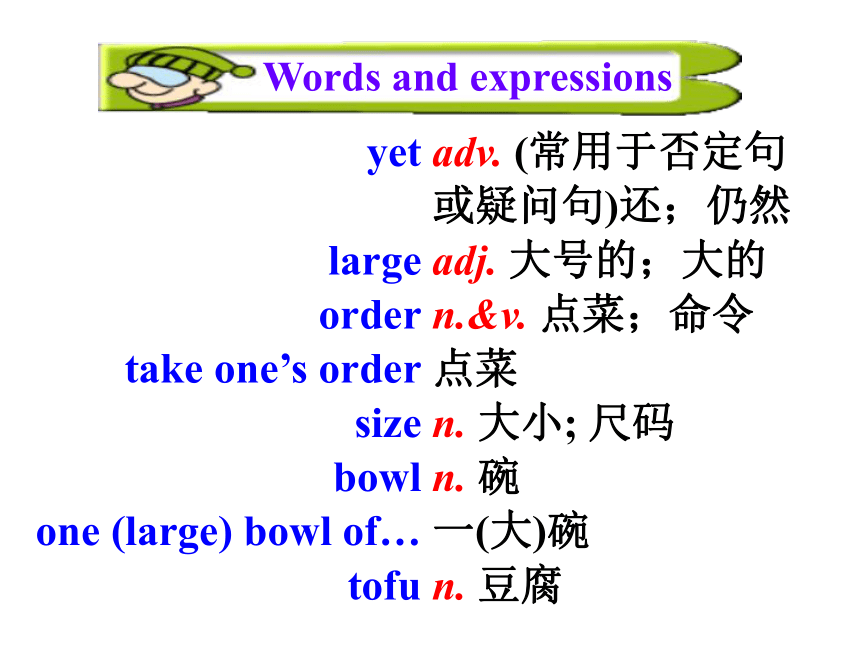
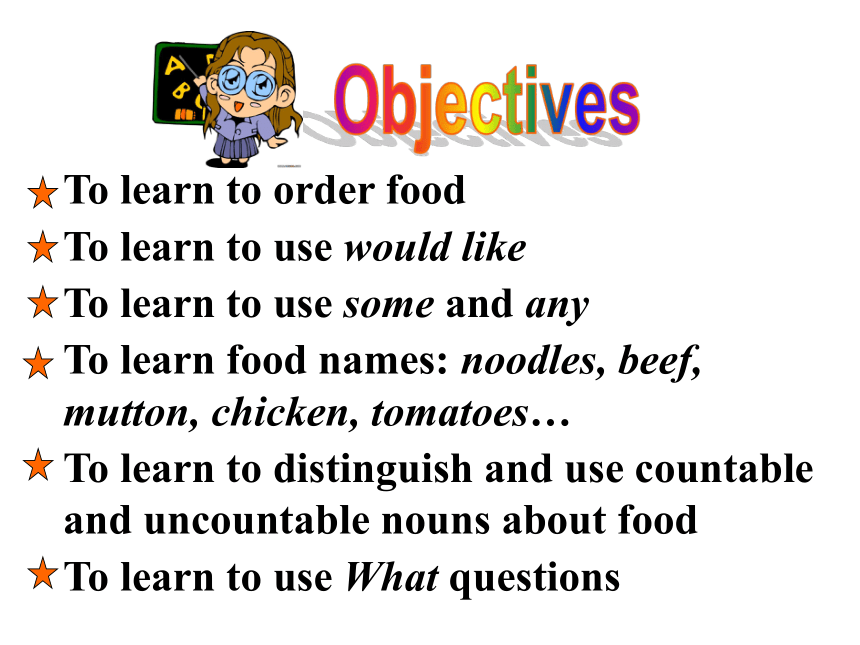
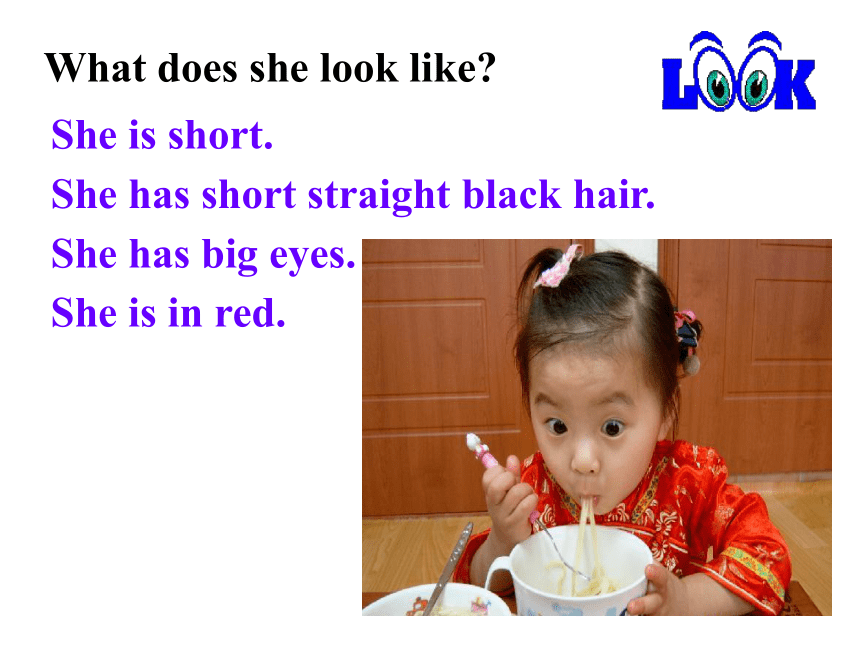

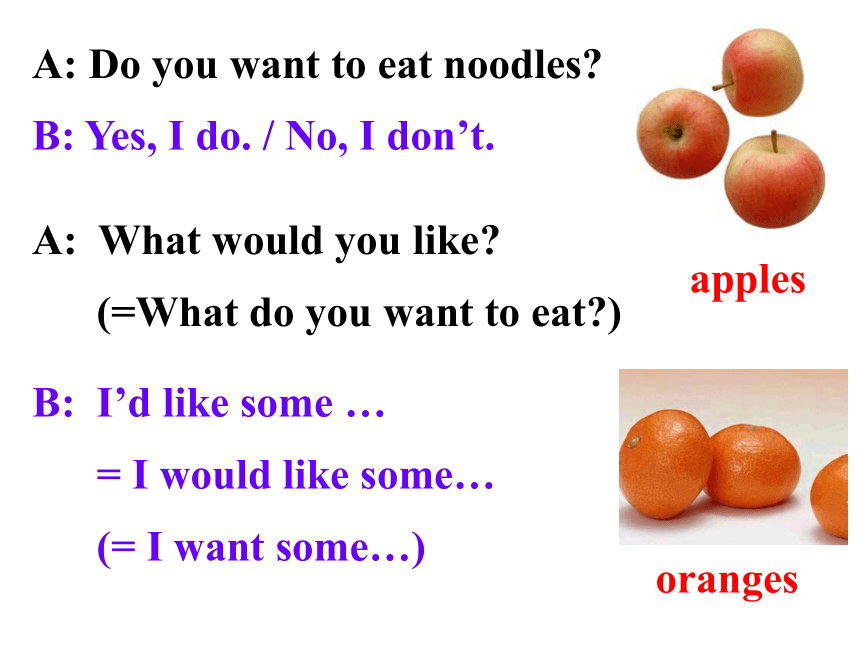
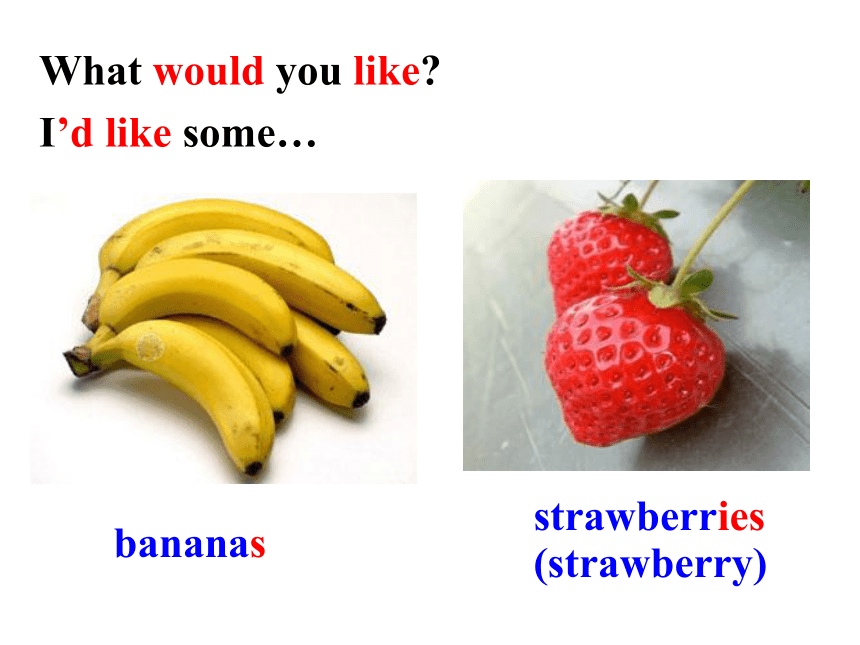
文档简介
(共83张PPT)
Unit 10
I’d like some noodles.
Section A
Period One
Review
Words and expressions
Read the words and expressions loudly.
noodle
mutton
beef
cabbage
potato
special
would
would like
n. 面条(常用复数)
n. 羊肉
n. 牛肉
n. 卷心菜;洋白菜
n. 土豆; 马铃薯
n. 特色菜;特价品
adj. 特别的;特殊的
modal v. (表示意愿)愿意
(表示意愿)愿意;喜欢
Words and expressions
yet
large
order
take one’s order
size
bowl
one (large) bowl of…
tofu
adv. (常用于否定句或疑问句)还;仍然
adj. 大号的;大的
n.&v. 点菜;命令
点菜
n. 大小; 尺码
n. 碗
一(大)碗
n. 豆腐
Words and expressions
To learn to order food
To learn to use would like
To learn to use some and any
To learn food names: noodles, beef, mutton, chicken, tomatoes…
To learn to distinguish and use countable and uncountable nouns about food
To learn to use What questions
What does she look like
She is short.
She has short straight black hair.
She has big eyes.
She is in red.
What is she doing
She is eating noodles.
A: What would you like
(=What do you want to eat )
B: I’d like some …
= I would like some…
(= I want some…)
A: Do you want to eat noodles
apples
oranges
B: Yes, I do. / No, I don’t.
bananas
strawberries
What would you like
I’d like some…
(strawberry)
oranges
What would you like
I’d like some…
pears
What would you like
I’d like some…
apples
What would you like
I’d like some…
bananas
What would you like
I’d like some…
strawberries
What would you like
I’d like some…
pineapples
What would you like
I’d like some…
grapes
What would you like
I’d like some…
watermelons
What would you like
I’d like some…
A: What kind of would you like
B: I’d like some….
fruit
strawberries
oranges
apples
pears
bananas
watermelons
tomatoes
potato
What would you like
I’d like some…
carrots
cabbages
What would you like
I’d like some…
broccoli
onions
What would you like
I’d like some…
A: What kind of would you like
B: I’d like some…
vegetables
cabbages
potatoes
carrots
broccoli
tomatoes
onions
beef
mutton
What would you like
I’d like some…
chicken
fish
What would you like
I’d like some…
pork
A: What kind of would you like
B: I’d like some…
meat
chicken
fish
mutton
beef
pork
What would you / he / she like
I / He / She’d like some…
Let’s chant!
What, what, what would you like
Beef, beef, I’d like some beef.
What, what, what would he like
Mutton, mutton, he’d like some mutton.
What, what, what would she like
Fish,fish, she’d like some fish.
What, what, what would they like
Chicken,chicken, they’d like some chicken.
Are you hungry
Let’s go to the restaurant!
(特色菜)
special
What would you like
I’d like some________.
noodles
noodles
A: What kind of noodles
would you like
B: I’d like beef and
tomato noodles.
Special 1
A: What kind of noodles
would you like
B: I’d like chicken and
cabbage noodles.
Special 2
A: What kind of noodles
would you like
B: I’d like mutton and
potato noodles.
Special 3
____________noodles would he like
He______ egg and beef noodles.
What kind of
’d like
What kind of noodles would you like
I’d like and noodles.
Group work
a small
a medium
a large
bowl of noodles
bowl of noodles
bowl of noodles
A: What size would you like
B: I’d like …
Pairwork
A: Can I help you
B: Yes, please. I’d like some noodles.
A: What kind of noodles would you like
B: I’d like …
A: What size would you like
B: I would like …
Match the words with the foods. (1a)
1. mutton ___
2. beef____
3. noodles____
4. chicken____
5. cabbage____
6. potatoes___
7. tomatoes___
8. carrots____
g
d
e
a
f
b
c
h
___Special 1 ___Special 2 ___Special 3
√
Listen and check the noodles that the
person orders. (1b)
Waitress: ____________________
Boy: I’m not sure yet. Are there ___
vegetables in the beef _______
Waitress: Yes, ________ some tomatoes.
Boy: OK, I _________ the
beef noodles, please.
Listen again and fill in the blanks.
any
noodles
What would you like
would like
noodles
there are
Pair work
Practice the conversation in 1a with your partner. Then make your own conversations. (1c)
1. ___noodles 2. ____beef
3. ___mutton 4. ____chicken
5. ___tomatoes 6. ____cabbage
7. ___potatoes 8. ____ vegetables
√
√
√
√
√
√
Listen and check the names of the foods your hear. (2a)
√
Listen again. Complete the sentences. (2b)
Boy: 1. I’d like a _____ bowl of noodles.
2. I’d like ______, ______ and
_______ noodles, please.
Girl: 1. I’d like a _______ bowl.
2. I’d like ____ and ______
noodles, please.
chicken
potato
large
medium
beef
cabbage
tomato
What kind of noodles would you like
I’d like beef noodles, please.
Pair work
Ask and answer questions in pairs. (2c)
Pair work
Role-play the conversation. (2d)
Waiter: Good afternoon. May I take
your order
Sally: Yes. Are there any vegetables
in the beef soup
Waiter: Yes. There are some tomatoes.
Sally: OK. We’d like one bowl of
beef soup.
Waiter: Sure. What size would you
like
Sally: Large, please.
Tom: We’d also like gongbao chicken
and some mapo tofu with rice.
Waiter: OK. One large bowl of beef soup,
one gongbao chicken, and one
mapo tofu with rice.
Tom: Yes, that’s right.
Name Kind of noodles Size bowl
… beef and tomato large
1. Work in groups and ask:
What kind of noodles would you like What size would you like
2. Then make a report:
I’d like a small bowl of …noodles.
…would like a large bowl of … noodles… And …would like….
1. A: What would you like
您需要什么?
B: I’m not sure yet. 我还没想好。
would like和want表示“要;想要”,
但两者语气上差别较大。前者礼貌委
婉、正式规范,后者直接、非正式且
随意。如:
I’d like a cup of black tea with milk,
please. 请给我来杯加奶的红茶。
I want some hot tea, Mom.
妈妈,我想喝些热茶。
What do you want to eat today,
children
孩子们,今天你们想吃些什么?
What would you like to order, sir
先生,您想点些什么?
名词可分为可数名词和不可数名词。可数名词有单复数之分,前面可加数词或冠词。
Grammar focus
可数名词包括:
(1) 普通名词;
(2) 集体名词;
(3) 少数专有名词。
如: boy, book, family等都是可数名词。
普通名词是一类人或东西或是一个抽象概念的名称。如: boy, office, idea, book, mile等。
1. 普通名词受代词或所有格修饰时, 不
再加冠词。如: this (my, every, each,
John’s) book, our books。
2. 复数普通名词可用 many, few, a few, a
lot of 等修饰; 不用 much, little 等修
饰。
普通名词
集体名词
1. 集体名词是表示由若干个体组成的
集合体的名称。如:family, class,
police, cattle, jewelry 等。
2. 集体名词用 many, few, a few, a lot
of 等修饰, 不用 much, little修饰。
可数名词复数变化规则
1) 单数名词加s: students, apples,
bags, trees, books, brothers?
2) 以s、x、sh、ch结尾的名词加es:
glasses, boxes, brushes, matches?
3) 以辅音字母加y结尾的名词, 变y为i
加es: cities, babies, enemies
4) 以f或fe结尾的名词,多数变f为v加
es: wives, knives; 但有些词只加s:
roofs, proofs, chiefs?
5) 以o结尾的名词,有些加es: Negroes,
heroes, tomatoes, potatoes; 其它加s:
radios, zoos, pianos, photos.?
以o结尾的名词复数有的要加-es,有的
要加s, 一般来说无生命的名词变复数时
加-s, 有生命则加-es, 同学们不妨记住下
面两句话:
小马虎弹着钢琴(piano)听着收音机
(radio),又到动物园(zoo)照了张相
(photo),但考试得了个大鸡蛋(零分
zero),一律加s。
(2) 黑人(Negro)英雄(hero)爱吃土豆
(potato)西红柿(tomato),全部加es。
6) 不规则名词:
foot→ feet goose→ geese
tooth→ teeth child→ children
man→ men woman→ women
sheep→ sheep deer→ deer
mouse→ mice
7) 复合名词变复数: 以不可数名词结尾
的复合名词无复数形式,如:
homework
以man或woman为前缀的复合名词变
复数, 前后两个名词都变复数, 如:
man servant→ men servants,
woman student → women students
不可数名词
不可数名词主要包括两大类:物质名词与抽象名词。物质名词表示无法为个体的实物,如:食物、水、金属等,例如:rice, meat, bread, water, iron, steel, copper; 抽象名词为动作、状态、品质等无法计数的抽象概念,例如:advice, confidence, knowledge, shame, heat, darkness。
There are all kinds of food and drink pictures. Let’s divide them into two groups:
(1) Countable nouns
(2) Uncountable nouns
(1) Countable nouns (可数名词):
dumplings, eggs, hamburgers, French fries, sandwiches, ice creams, hot dogs, apples, pears, bananas, grapes, strawberries, cabbages, potatoes, tomatoes, onions, oranges, chickens…
(2) Uncountable nouns (不可数名词):
rice, meat, beef, pork, chicken, fish, green tea, salad, mutton, broccoli, porridge, soup, juice, cabbage …
dumpling
dumplings
soup
soup
/fi /
fishes
/fi iz/
fish
fish
fish
种类
鱼肉
rice
rice
orange juice
orange juice
porridge
porridge
onion
onions
- What kind of noodles would you like
- I’d like beef noodles, please.
- What size would you like
I’d like a small/medium/large bowl,
please.
课时重点回顾
Is there any meat in the tomato and egg
soup
- No, there isn’t any./No, there’s no meat.
-Would you like a large bowl
-Yes, please.
课时重点回顾
Countable nouns:
bowls, apples, carrots, oranges,
strawberries
-Uncountable nouns:
beef, meat, milk, mutton, water
-Countable and uncountable nouns:
chicken, salad, ice-cream, cabbage
课时重点回顾
注: 另附word文档。
点击此处链接
选择适当的单词完成句子。
would, special, noodles, large, size
1. What ______ bowl of soup does the
boy want
2. Would you like some beef ________
3. Oh, this T-shirt is too ________. It
doesn’t fit (适合) me.
4. This is the ________ in this restaurant.
It’s very delicious (美味的).
5. His father ________ like some mutton.
size
noodles
large
special
would
填入恰当的问句完成下列对话。
1. — ____________________________
— A medium bowl, please.
2. — ____________________________
— Yes, please. I like chicken.
3. — _____________________________
— She’d like to eat a hamburger.
4. — ________________________________
— I’d like tomato and egg noodles.
What size bowl would you like
Would you like some chicken
What would she like to eat
What kind of noodles would you like
Translate and write them down.
1. 我想要些面条。
2. - 你想要哪种面条?
- 请给我牛肉西红柿面条。
I’d like some noodles.
What kind of noodles would you like
Beef and tomato noodles, please.
3. 牛肉面里头有蔬菜吗?
4. 西红柿鸡蛋汤里面有肉吗?
Are there any vegetables in the beef noodles
Is there any meat in the tomato and egg soup
To preview the new words and expressions
To preview the conversation in 3a
Unit 10
I’d like some noodles.
Section A
Period One
Review
Words and expressions
Read the words and expressions loudly.
noodle
mutton
beef
cabbage
potato
special
would
would like
n. 面条(常用复数)
n. 羊肉
n. 牛肉
n. 卷心菜;洋白菜
n. 土豆; 马铃薯
n. 特色菜;特价品
adj. 特别的;特殊的
modal v. (表示意愿)愿意
(表示意愿)愿意;喜欢
Words and expressions
yet
large
order
take one’s order
size
bowl
one (large) bowl of…
tofu
adv. (常用于否定句或疑问句)还;仍然
adj. 大号的;大的
n.&v. 点菜;命令
点菜
n. 大小; 尺码
n. 碗
一(大)碗
n. 豆腐
Words and expressions
To learn to order food
To learn to use would like
To learn to use some and any
To learn food names: noodles, beef, mutton, chicken, tomatoes…
To learn to distinguish and use countable and uncountable nouns about food
To learn to use What questions
What does she look like
She is short.
She has short straight black hair.
She has big eyes.
She is in red.
What is she doing
She is eating noodles.
A: What would you like
(=What do you want to eat )
B: I’d like some …
= I would like some…
(= I want some…)
A: Do you want to eat noodles
apples
oranges
B: Yes, I do. / No, I don’t.
bananas
strawberries
What would you like
I’d like some…
(strawberry)
oranges
What would you like
I’d like some…
pears
What would you like
I’d like some…
apples
What would you like
I’d like some…
bananas
What would you like
I’d like some…
strawberries
What would you like
I’d like some…
pineapples
What would you like
I’d like some…
grapes
What would you like
I’d like some…
watermelons
What would you like
I’d like some…
A: What kind of would you like
B: I’d like some….
fruit
strawberries
oranges
apples
pears
bananas
watermelons
tomatoes
potato
What would you like
I’d like some…
carrots
cabbages
What would you like
I’d like some…
broccoli
onions
What would you like
I’d like some…
A: What kind of would you like
B: I’d like some…
vegetables
cabbages
potatoes
carrots
broccoli
tomatoes
onions
beef
mutton
What would you like
I’d like some…
chicken
fish
What would you like
I’d like some…
pork
A: What kind of would you like
B: I’d like some…
meat
chicken
fish
mutton
beef
pork
What would you / he / she like
I / He / She’d like some…
Let’s chant!
What, what, what would you like
Beef, beef, I’d like some beef.
What, what, what would he like
Mutton, mutton, he’d like some mutton.
What, what, what would she like
Fish,fish, she’d like some fish.
What, what, what would they like
Chicken,chicken, they’d like some chicken.
Are you hungry
Let’s go to the restaurant!
(特色菜)
special
What would you like
I’d like some________.
noodles
noodles
A: What kind of noodles
would you like
B: I’d like beef and
tomato noodles.
Special 1
A: What kind of noodles
would you like
B: I’d like chicken and
cabbage noodles.
Special 2
A: What kind of noodles
would you like
B: I’d like mutton and
potato noodles.
Special 3
____________noodles would he like
He______ egg and beef noodles.
What kind of
’d like
What kind of noodles would you like
I’d like and noodles.
Group work
a small
a medium
a large
bowl of noodles
bowl of noodles
bowl of noodles
A: What size would you like
B: I’d like …
Pairwork
A: Can I help you
B: Yes, please. I’d like some noodles.
A: What kind of noodles would you like
B: I’d like …
A: What size would you like
B: I would like …
Match the words with the foods. (1a)
1. mutton ___
2. beef____
3. noodles____
4. chicken____
5. cabbage____
6. potatoes___
7. tomatoes___
8. carrots____
g
d
e
a
f
b
c
h
___Special 1 ___Special 2 ___Special 3
√
Listen and check the noodles that the
person orders. (1b)
Waitress: ____________________
Boy: I’m not sure yet. Are there ___
vegetables in the beef _______
Waitress: Yes, ________ some tomatoes.
Boy: OK, I _________ the
beef noodles, please.
Listen again and fill in the blanks.
any
noodles
What would you like
would like
noodles
there are
Pair work
Practice the conversation in 1a with your partner. Then make your own conversations. (1c)
1. ___noodles 2. ____beef
3. ___mutton 4. ____chicken
5. ___tomatoes 6. ____cabbage
7. ___potatoes 8. ____ vegetables
√
√
√
√
√
√
Listen and check the names of the foods your hear. (2a)
√
Listen again. Complete the sentences. (2b)
Boy: 1. I’d like a _____ bowl of noodles.
2. I’d like ______, ______ and
_______ noodles, please.
Girl: 1. I’d like a _______ bowl.
2. I’d like ____ and ______
noodles, please.
chicken
potato
large
medium
beef
cabbage
tomato
What kind of noodles would you like
I’d like beef noodles, please.
Pair work
Ask and answer questions in pairs. (2c)
Pair work
Role-play the conversation. (2d)
Waiter: Good afternoon. May I take
your order
Sally: Yes. Are there any vegetables
in the beef soup
Waiter: Yes. There are some tomatoes.
Sally: OK. We’d like one bowl of
beef soup.
Waiter: Sure. What size would you
like
Sally: Large, please.
Tom: We’d also like gongbao chicken
and some mapo tofu with rice.
Waiter: OK. One large bowl of beef soup,
one gongbao chicken, and one
mapo tofu with rice.
Tom: Yes, that’s right.
Name Kind of noodles Size bowl
… beef and tomato large
1. Work in groups and ask:
What kind of noodles would you like What size would you like
2. Then make a report:
I’d like a small bowl of …noodles.
…would like a large bowl of … noodles… And …would like….
1. A: What would you like
您需要什么?
B: I’m not sure yet. 我还没想好。
would like和want表示“要;想要”,
但两者语气上差别较大。前者礼貌委
婉、正式规范,后者直接、非正式且
随意。如:
I’d like a cup of black tea with milk,
please. 请给我来杯加奶的红茶。
I want some hot tea, Mom.
妈妈,我想喝些热茶。
What do you want to eat today,
children
孩子们,今天你们想吃些什么?
What would you like to order, sir
先生,您想点些什么?
名词可分为可数名词和不可数名词。可数名词有单复数之分,前面可加数词或冠词。
Grammar focus
可数名词包括:
(1) 普通名词;
(2) 集体名词;
(3) 少数专有名词。
如: boy, book, family等都是可数名词。
普通名词是一类人或东西或是一个抽象概念的名称。如: boy, office, idea, book, mile等。
1. 普通名词受代词或所有格修饰时, 不
再加冠词。如: this (my, every, each,
John’s) book, our books。
2. 复数普通名词可用 many, few, a few, a
lot of 等修饰; 不用 much, little 等修
饰。
普通名词
集体名词
1. 集体名词是表示由若干个体组成的
集合体的名称。如:family, class,
police, cattle, jewelry 等。
2. 集体名词用 many, few, a few, a lot
of 等修饰, 不用 much, little修饰。
可数名词复数变化规则
1) 单数名词加s: students, apples,
bags, trees, books, brothers?
2) 以s、x、sh、ch结尾的名词加es:
glasses, boxes, brushes, matches?
3) 以辅音字母加y结尾的名词, 变y为i
加es: cities, babies, enemies
4) 以f或fe结尾的名词,多数变f为v加
es: wives, knives; 但有些词只加s:
roofs, proofs, chiefs?
5) 以o结尾的名词,有些加es: Negroes,
heroes, tomatoes, potatoes; 其它加s:
radios, zoos, pianos, photos.?
以o结尾的名词复数有的要加-es,有的
要加s, 一般来说无生命的名词变复数时
加-s, 有生命则加-es, 同学们不妨记住下
面两句话:
小马虎弹着钢琴(piano)听着收音机
(radio),又到动物园(zoo)照了张相
(photo),但考试得了个大鸡蛋(零分
zero),一律加s。
(2) 黑人(Negro)英雄(hero)爱吃土豆
(potato)西红柿(tomato),全部加es。
6) 不规则名词:
foot→ feet goose→ geese
tooth→ teeth child→ children
man→ men woman→ women
sheep→ sheep deer→ deer
mouse→ mice
7) 复合名词变复数: 以不可数名词结尾
的复合名词无复数形式,如:
homework
以man或woman为前缀的复合名词变
复数, 前后两个名词都变复数, 如:
man servant→ men servants,
woman student → women students
不可数名词
不可数名词主要包括两大类:物质名词与抽象名词。物质名词表示无法为个体的实物,如:食物、水、金属等,例如:rice, meat, bread, water, iron, steel, copper; 抽象名词为动作、状态、品质等无法计数的抽象概念,例如:advice, confidence, knowledge, shame, heat, darkness。
There are all kinds of food and drink pictures. Let’s divide them into two groups:
(1) Countable nouns
(2) Uncountable nouns
(1) Countable nouns (可数名词):
dumplings, eggs, hamburgers, French fries, sandwiches, ice creams, hot dogs, apples, pears, bananas, grapes, strawberries, cabbages, potatoes, tomatoes, onions, oranges, chickens…
(2) Uncountable nouns (不可数名词):
rice, meat, beef, pork, chicken, fish, green tea, salad, mutton, broccoli, porridge, soup, juice, cabbage …
dumpling
dumplings
soup
soup
/fi /
fishes
/fi iz/
fish
fish
fish
种类
鱼肉
rice
rice
orange juice
orange juice
porridge
porridge
onion
onions
- What kind of noodles would you like
- I’d like beef noodles, please.
- What size would you like
I’d like a small/medium/large bowl,
please.
课时重点回顾
Is there any meat in the tomato and egg
soup
- No, there isn’t any./No, there’s no meat.
-Would you like a large bowl
-Yes, please.
课时重点回顾
Countable nouns:
bowls, apples, carrots, oranges,
strawberries
-Uncountable nouns:
beef, meat, milk, mutton, water
-Countable and uncountable nouns:
chicken, salad, ice-cream, cabbage
课时重点回顾
注: 另附word文档。
点击此处链接
选择适当的单词完成句子。
would, special, noodles, large, size
1. What ______ bowl of soup does the
boy want
2. Would you like some beef ________
3. Oh, this T-shirt is too ________. It
doesn’t fit (适合) me.
4. This is the ________ in this restaurant.
It’s very delicious (美味的).
5. His father ________ like some mutton.
size
noodles
large
special
would
填入恰当的问句完成下列对话。
1. — ____________________________
— A medium bowl, please.
2. — ____________________________
— Yes, please. I like chicken.
3. — _____________________________
— She’d like to eat a hamburger.
4. — ________________________________
— I’d like tomato and egg noodles.
What size bowl would you like
Would you like some chicken
What would she like to eat
What kind of noodles would you like
Translate and write them down.
1. 我想要些面条。
2. - 你想要哪种面条?
- 请给我牛肉西红柿面条。
I’d like some noodles.
What kind of noodles would you like
Beef and tomato noodles, please.
3. 牛肉面里头有蔬菜吗?
4. 西红柿鸡蛋汤里面有肉吗?
Are there any vegetables in the beef noodles
Is there any meat in the tomato and egg soup
To preview the new words and expressions
To preview the conversation in 3a
同课章节目录
- Unit 1 Can you play the guitar?
- Section A
- Section B
- Unit 2 What time do you go to school?
- Section A
- Section B
- Unit 3 How do you get to school?
- Section A
- Section B
- Unit 4 Don't eat in class.
- Section A
- Section B
- Unit 5 Why do you like pandas?
- Section A
- Section B
- Unit 6 I'm watching TV.
- Section A
- Section B
- Review of Units 1-6
- Unit 7 It's raining!
- Section A
- Section B
- Unit 8 Is there a post office near here?
- Section A
- Section B
- Unit 9 What does he look like?
- Section A
- Section B
- Unit 10 I'd like some noodles.
- Section A
- Section B
- Unit 11 How was your school trip?
- Section A
- Section B
- Unit 12 What did you do last weekend?
- Section A
- Section B
